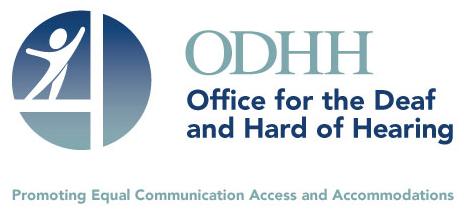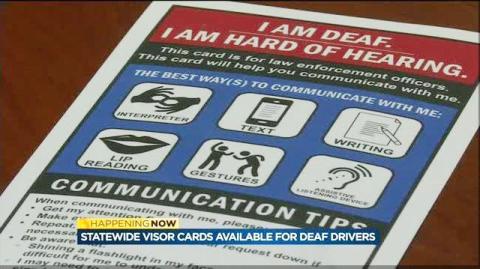Office for the Deaf and Hard of Hearing
Video send-off for Bette Mentz-Powell
In this video, Christopher Rawlings congratulates Bette on her retirement and thanks her for her 41 years of state service.
He also shares updates about the Service Fund program.
New contacts for service fund and telecommunications assistance programs
Due to ODHH staff retirements, contact information has changed for two of our programs.
Telecommunications Assistance Program (TAP)
The TAP email address (dhstap@dhs.wisconsin.gov) has not changed, but the phone and fax numbers have.
Contact the ODHH office by phone or leave a video message at 855-359-5252 and send any TAP-related faxes to 608-224-5754.
Service fund
As of August 1, 2024, any service fund correspondence sent to Bette Mentz-Powell will not be received. Send all service fund questions, concerns, requests, and documentation to Steve Smart by emailing Steven.Smart@dhs.wisconsin.gov. Voice and video messages can be left for Steve by contacting the ODHH office at 855-359-5252, and service fund-related faxes can be sent to 608-224-5754.
Video from ODHH Director, Christopher Rawlings
In this video, Christopher introduces himself and invites you to connect with him and other ODHH staff to learn more about the office and to share your ideas and suggestions.
Council for the Deaf and Hard of Hearing
The Council for the Deaf and Hard of Hearing is a group of nine people who are Deaf, Hard of Hearing, DeafBlind, and hearing (such as a parent of a Deaf child, teacher of the Deaf, or interpreter) appointed by the Governor to advise him, the Department of Health Services, and ODHH about issues and concerns affecting over 500,000 people in Wisconsin who are Deaf, Hard of Hearing and/or DeafBlind.
Behavioral Health Initiative (BHI)
The Office for the Deaf and Hard of Hearing (ODHH) has received funding from the Department of Health Services (DHS) to improve access, quality, and outcomes of behavioral health care services to people who are Deaf, hard of hearing, and DeafBlind. ODHH has designed the Behavioral Health Initiative with the objective of creating a sustainable website housing various resources for the State of Wisconsin. Learn more about the Behavioral Health Initiative.
Visor card for drivers who are Deaf and Hard of Hearing
ODHH offers a visor card for drivers who are Deaf and Hard of Hearing, P-02027 (PDF), to better communicate with law enforcement during traffic stops.
If you are interested in getting the visor card, P-02027 (PDF) and instructions for proper placement, P-02027i (PDF) contact Caroline Ludka by emailing Caroline.Ludka@dhs.wisconsin.gov or phone at 262-565-6349.
Services we provide
- Benefits - Need help with Social Security, Medicare, or others?
- Communication Access - Tips for everyone on communication.
- Communication Access Realtime Translation (CART) - This service is gaining popularity for communication access.
- Rights and Laws - A listing of rights, laws, and links to help guide you to the right place to file a complaint.
- DeafBlind Resources - Several links are included to help you to find information.
- Demographic Reports - Over the years, various large-scale research organizations (including the Census Bureau) have used survey questions to find out how many people identify themselves as having health problems, functional limitations, impairments or disabilities.
- Hearing Aids and Cochlear Implants - Information about hearing aids, cochlear implants, hearing health, and hearing loss is presented.
- Training and Presentation Requests - Free trainings and presentations on a variety of topics including: hearing loss, accessibility, cultural sensitivity, telecommunications, and assistive technology devices, touching on rights and laws.
- Substance Use Disorder and Mental Health Services (SUD/MH) Information - A resource page has been developed to find an appropriate agency, program, or office in your area.
- Service Fund - Pays for communication access (sign language interpreters, CART, or SSP's) services for people who are Deaf, DeafBlind, and Hard of Hearing in certain situations not covered under the Americans with Disabilities Act (ADA) or Section 504 of the Rehabilitation Act.
- Sign Language Interpreting - Need to know how to schedule an interpreter or who is the right person?
- Technology Accommodations - A range of technology information is available.
- Telecommunications Assistance Program - TAP provides funds to people who meet income and hearing loss eligibility criteria as a means to assist in the purchase of specialized telecommunication devices, such as a TTY.
Contact us
Can't find what you are looking for? Contact us. Let us know how our website can better serve your needs. Send your comments to dhsodhh@dhs.wisconsin.gov.



